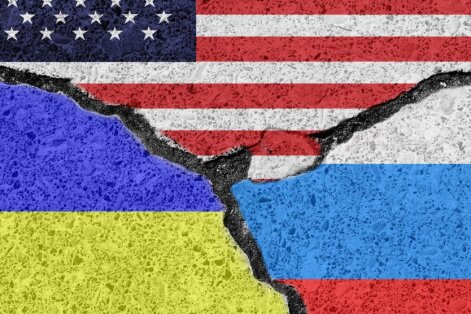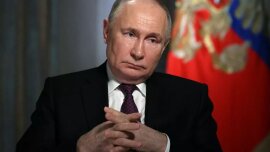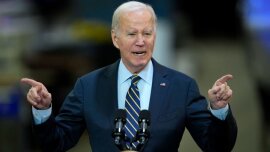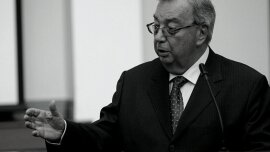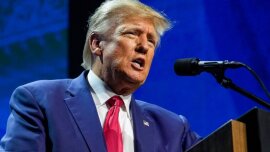So, the first video meeting between the presidents of the United States and the Russian Federation, the one that everyone talked and wrote about so much over the past few weeks, took place.
At first glance, if you read the official statements of the parties, this virtual conversation was meant to enlighten the viewer about the development of new technical capabilities of the new reality of the XXI century by representatives of generations who didn’t know in their youth and even adulthood what a computer and the Internet are.
It was initially comprehended that a joint communique would not be published following the meeting. That in itself indicated a working format of the meeting without any serious decisions and agreements. The lack of expectation of "breakthroughs" was also stated by Putin's press secretary, Peskov. And even though after the meeting between Putin and Biden in Geneva, the presidents of the United States and the Russian Federation answered journalists' questions alone, this time everything was limited to the scanty statements of the press service and representatives of the administrations.
On the American side, the main speakers were National Security Adviser Jake Sullivan, as well as State Department spokesman Victoria Nuland, who, as under Obama, oversees the Ukrainian direction and recently flew to Moscow for negotiations. The American side has once again declared its unshakable support for the sovereignty and territorial integrity of Ukraine, its readiness to impose new sanctions in the event of a full-scale aggression by the Russian Federation. Sullivan said that if Putin suddenly decides to attack Ukraine (as if he hadn’t done it yet), then the United States “will do what it didn’t do in 2014”. This, in my opinion, is the main quote and slip of the tongue according to Freud following the meeting. If the United States had fiercely rebuffed the Kremlin, and at least made it clear in February-March 2014 that they would disconnect Russia from Swift, impose severe sanctions, freeze the assets of Russian officials and their families in the West, then I’m sure neither the occupation of Crimea, let alone the war in Donbass, would not have happened. As well as the subject of the current negotiations.
Though now, eight years after the start of Russia's undeclared war against Ukraine, Putin regularly allows testing the strength of the nerves of his Western "allies", rattling weapons at our borders, demanding to complete in practice the surrender of Ukraine in Minsk, hastily drawn up by some unknown person (based on the signatures) in February 2015.
Unlike the meeting in Geneva in June this year, it was Ukraine that was the main topic of the talks, which at the summer summit, according to Putin, was "touched upon only with a stroke." And if in Switzerland the possibility of Ukraine's joining NATO was not discussed in principle, since, according to his own admission, there are no such prospects in the foreseeable future, then on the eve of a new round of negotiations the master of the Kremlin has already begun to demand guarantees that Ukraine will not join the North Atlantic alliance in principle, to close the issue once and for all.
To which the representatives of the White House, as expected, said that it was kind of the business of Ukraine itself and the NATO countries to decide who and when to join. That is, exactly what sounds so sweet both for the American, and even more so for the Ukrainian "ears".
However, under the streamlined diplomatic wording about recognizing the readiness to start such a dialogue with the Kremlin, in principle, there is already a "carrot" for Putin. It seems as if his "waving his boot" (crossed out), weapon-rattling with shouts of "I will show you Kuzkin's mother" near our borders gave some result that could be correctly presented to Soloviev and Co. inexperienced Russian TV audience.
Overall, Biden's communication with Putin should be regarded as a summing up of interim results on the tacit agreements that were reached in Geneva six months ago. As we remember, exactly how much the US President Joe Biden himself devoted to their implementation. The term came to an end and it was Putin who wanted to summarize the interim results. Because its main goal of forcing Ukraine to fulfill the political part of the Minsk agreements - was not achieved. It is quite possible that the objective factors prevented this - the failure of the special operation to withdraw the US military contingent from Afghanistan and, on the contrary, the brilliant performance of the special operation to evacuate Afghan refugees already by the Ukrainian intelligence officers, who were applauded all over the world.
After such feasible help from Ukraine, to keep a good face on Biden's face in the face of a frankly bad game in Afghanistan, as well as against the backdrop of a wave of stunning criticism from Republicans for the deal with Merkel on Nord Stream-2, Biden could no longer openly force Zelensky in Washington to do a political suicide. commit suicide. And not because his conscience would not allow him, but simply because of the proceeding of a boring political calculation and with an eye on his ratings, with which things have been going very badly in recent months.
In fact, the main practical result of Putin's negotiations with Biden against the background of ritual statements on both sides in Ukraine was the disappearance of the amendment from the bill on the military budget for 2022 agreed by both chambers of the US Congress on sanctions against Nord Stream 2, which the Republicans insisted on (by disrupting the first vote). This is it, the final result of the agreements on the part of Biden in Geneva. There will definitely not be any surprises from the United States (as it was under Trump more than once), and now the question of completing certification and launching Putin's main geopolitical brainchild of the past five years, which will tie Germany and other EU countries to Russian gas supplies for a long time, is already becoming a matter of time and technology. At the same time, the Ukrainian GTS is turning from the umbilical cord connecting the Russian Federation and the EU into a birth trauma of the “Belovezhskaya Agreements”, or rather the appendix, which Putin will happily cut out three years after the completion of the contract between “Naftogaz” and “Gazprom”.
The Kremlin loves symbolism and round dates. It was on the eve of the 30th anniversary of the signing of the Bialowieza Accords, which became the culmination of "the greatest geopolitical tragedy of the 20th century," according to Putin, that he finally resolved the issue of removing the main obstacle to returning Ukraine by military means - the Ukrainian gas transportation system. And the revival of the USSR, as Victoria Nuland said after Biden's negotiations with Putin, is still his fixed idea.
A logical question arises: what’s coming next? “Next”, the White House passes the baton of the "Ukrainian issue" to its European partners. Let them now decide for themselves. It is no coincidence that it was French President, Emmanuel Macron, who became the main newsmaker after consultations with the White House following yesterday's meeting. Now he, as a representative of the Normandy format, is going to talk with Putin and Zelensky on further steps in resolving the conflict in Donbass. For Putin's return to the path of negotiations and consultations is the main strategic goal of Paris.
And this is not surprising, since Macron has his president elections next year. And the status of the main peacemaker on the European continent will be very useful to him for his re-election for a second term. There is little left to do. With the help of "your friend" Putin, to "bend" Zelensky. It doesn't matter at all that what could become a lifeline for him in the presidential race could become a rope around Zelensky's neck. This is politics. There is no room for sentimentality. And to betray in time is to foresee.
